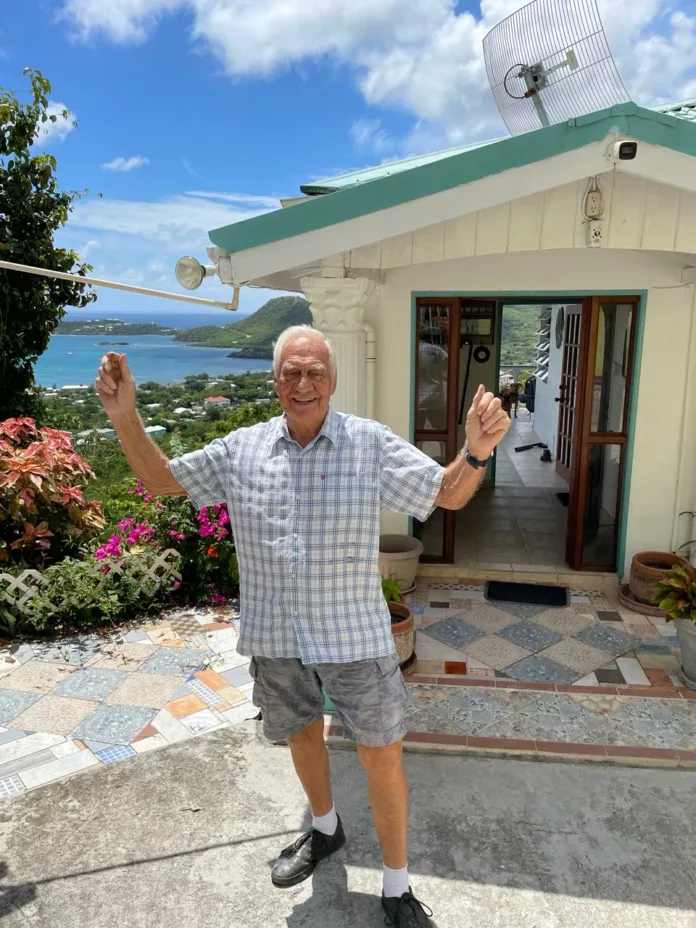By Gemma Handy
A Monk’s Hill resident is celebrating a Privy Council ruling granting him unrestricted access to his own home after a tortuous legal battle spanning 17 years.
Geoffrey Croft told Observer of his jubilation at the judgement by the country’s highest appellate court, which followed a “nightmare” judicial journey and racked up a six-figure bill in expenses.
The British expat’s dream of a halcyon retirement in Antigua was shattered by a spat over access to his property with the owner of an adjacent private road, without which his home could not be reached by car.
“I had been on holiday here many times, and I decided to retire here. The house was also to be somewhere for my children after I pass away,” Croft, who moved to Antigua in 2006 from Nottingham, England, said.
“I went to a good lawyer in Antigua who checked all the relevant documents. On paper, there appeared to be no problem as the survey plan of the plot I purchased showed roads on both sides of my plot and there was nothing in the encumbrances section on the Land Registry documents,” he explained.
Croft was given the go-ahead by his lawyer to proceed with the purchase.
Within six months of starting construction on his home, however, his tribulations began.
“Out popped a man, and he came to my house and told me he owned the road outside and I mustn’t trespass on it,” he recalled.
With his property already half-built, Croft said it was too late for him to switch to a different location.
“Thereon we started a battle that carried on through the courts of Antigua,” he said.
In November 2007, Croft received a letter from Joseph Horsford informing him that Monk’s Hill Road was a “private road owned solely and exclusively” by Horsford and that Croft was trespassing.
Another letter sent in January 2008 asserted that Croft was allowed pedestrian access only. A further letter that August demanded payment of EC$750 per month for vehicular access along what Croft describes as “350 yards of dirt track”.
Croft’s refusal to pay saw Horsford increase his demand to EC$1,000 per month.
Croft’s land and the road in question once formed part of a 30-acre estate owned by Horsford’s father, which Horsford later inherited and which was subsequently divided into a large number of registered parcels.
The legal dilemma hinged on whether the land owned by Croft had the benefit of a right of way over Horsford’s road. While there is no express right of way, Croft contended that a right of way exists as an “easement of necessity”.
A previous judgement in Croft’s favour noted Croft’s property was landlocked and could not be accessed without traversing roads owned by Horsford.
“This is the epitome of an easement by necessity”, the judge held in a ruling later overturned by the Court of Appeal.
Over the years, trenches were dug and barriers erected as part of measures apparently taken by Horsford to prevent Croft using the road.
“He even dumped several tonnes of earth outside my gate once,” Croft said.
In its March 5 ruling, the Privy Council held that Croft “is entitled to a pedestrian and vehicular right of way” over the road.
Croft, who turned 90 last month, told Observer, “It has taken 17 years and many, many sad episodes over the years, but at long last I have won.
“After 17 years I can finally relax. It cost a lot of money but it’s been worth it; I can now retire in peace.”
The extent of the legal costs Croft can claw back from his estimated EC$100,000 expenses will only date back to the appeal stage, he said. A figure is currently being determined by the Privy Council.
Croft said blame for the fiasco should be shared by Horsford for failing to disclose facts to the surveyors, the survey department and also the judiciary for “inordinate delays” translating to long spells between hearings.
To avoid such disputes in future, he is calling on the government to implement disclosure legislation – common practice in other countries – “whereby anything not disclosed at the time of sale cannot be acted upon at a later date”.
Finally, after a “long and expensive journey”, Croft is looking forward to putting his feet up.
He added, “I did not come to the Caribbean to fight but to retire and enjoy the beautiful island of Antigua.”

